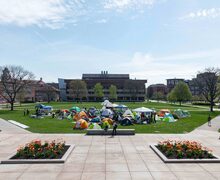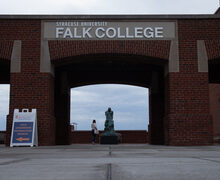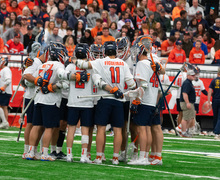SU hosts conference on white supremacy 200 years after Johnson v. McIntosh ruling
Maxine Brackbill | Photo Editor
The conference featured various panels and presentations with leading experts on issues related to the "Doctrine of Discovery." Speakers explored the historical and religious roots of white supremacy.
Support The Daily Orange this holiday season! The money raised between now and the end of the year will go directly toward aiding our students. Donate today.
Over 200 years after the United States Supreme Court’s Johnson v. Mclntosh decision, Syracuse University hosted a three-day-long conference exploring the historical and religious roots of white supremacy.
“The Religious Origins of White Supremacy: Johnson v. M’Intosh and the Doctrine of Christian Discovery” conference featured panels and presentations with leading experts on issues related to the “Doctrine of Discovery” from Friday to Sunday, including bishops and legal scholars, and featured Indigenous presentations.
The conference was sponsored by The Henry Luce Foundation, which awarded SU a three-year grant in Nov. 2021, alongside others including SU’s Religion Department, the Indigenous Values Initiative and the Neighbors of the Onondaga Nation.
Although this was the first time SU hosted the event, organizer Phillip Arnold said he has hosted events related to this topic for the last decade, noticing an increase in conversations regarding the Doctrine of Discovery.
“People are paying more and more attention to this issue,” Arnold, an associate professor in SU’s Religion department and core faculty member of Native American and Indigenous Studies, said. “I mean, 10 years ago, nobody was paying much attention. Not many people out of Indigenous peoples’ circles.”
In 1823, the Supreme Court declared that Indigenous tribes did not have the right to sell their land to individuals in the unanimous ruling of Johnson v. McIntosh. This ruling established that the British’s right to Indigenous lands was passed to the U.S., which had the exclusive right to negotiate with Indigenous people. The ruling states, “the Indians had no right of soil as sovereign, independent states” since “discovery is the foundation of title.”
The SCOTUS ruling was the legal introduction of documents originally published by the Catholic Church, called papal bulls, during the Age of Discovery. These documents, referred to now as the “Doctrine of Discovery,” stated that European colonial powers had the right to any land not inhabited by Christians, justifying European colonization, the seizure of land across the world as well as the massacre and dispossession of Indigenous societies.
Examining the impacts of Johnson v. McIntosh, Robert Miller, a professor of law at Arizona State University, said the case legitimized the European concept of “discovery” as a basis for claiming sovereignty over Indigenous lands. He also highlighted in his law panel the importance of looking at historical injustices toward Indigenous communities to understand their realities today, specifically citing a letter written by George Washington in 1783.
“(George Washington) compared Indians to animals,” Miller said. “He called us animals, and we were being hunted by the United States.”
In the U.S. and other countries where European colonists settled during the Age of Discovery, movements for the repudiation of the “Doctrine of Discovery” and the return of land to the Indigenous groups have gained traction. In March 2023, the Vatican followed other Christian denominations to repudiate it.
Arnold is also the founding director of the Skä·noñh—Great Law of Peace Center, which repurposed the site that formerly commemorated the Jesuits coming to Onondaga Nation Territory in the mid-1600s. The Skä·noñh Center has held similar events over the past decade, most recently online in 2020, but Arnold was ready to commit efforts and funds to move the conference to SU.
“This time, we really wanted to make a big event,” Arnold said. “We just really outgrew the Skä·noñh Center. It’s not big enough for this.”

Cassandra Roshu | Photo Editor
Over 300 people registered for the conference, Arnold said. Some panels were limited to those who registered and paid, while others were open to SU students and the public. Attendees at the conference included members of the Sámi peoples, the Māori people, a contingent from Brazil and members of Indigenous groups like the Haudenosaunee and Yakama Nation – all groups who have been historically affected by the McIntosh ruling.
Members of the Onondaga Nation were also present at the conference. The Onondaga Nation, like many other Indigenous peoples, has worked to get land back from New York state.
Ilianna Murphy, a junior at Simpson College who attended the conference, said her biggest takeaway is the importance of listening more to Indigenous people and recognizing the privilege of colonizers.
“Basically, a foundation of everything that we have is based on Christian documents, the document on Christian discovery,” Murphy said. “(We) should be realizing that we should give our lands back, that it wasn’t our land in the first place.”
The conference began Friday at the Skä·noñh Center. The evening featured a keynote by Steven Newcomb, a Shawnee-Lenape scholar and author focused on U.S. federal Indigenous law, and JoDe Goudy, a former chairman of the Yakama Nation.
Newcomb, the director of the Indigenous Law Institute, is a longtime advocate and scholar for Indigenous rights and conversations about the Doctrine of Discovery. He worked on Indigenous Peoples issues at the United Nations for 20 years and called on Pope Francis to discuss the Doctrine, which he calls the “Doctrine of Domination.”
Saturday’s schedule included a panel of bishops who discussed the religious history of the Doctrine, another on the religious origins of the Jan. 6 capitol attacks and a law panel reflecting on the 200th anniversary of McIntosh.
The law panel discussed Indigenous rights, colonial laws and historical legal decisions on Indigenous people, examining 200 years of the Johnson v. McIntosh decision and underscoring the long-lasting impacts of historical injustices and legal decisions against Indigenous communities.
Colonial laws and legal concepts, such as the Johnson v. McIntosh decision and the “Doctrine of Discovery,” continue to impact Indigenous communities today, Miller said, providing a legal framework for the unequal treatment of Indigenous people and forced removal from their ancestral lands.

Miranda Fournier | Design Editor
“I mean, here in Syracuse, we’re on unceded Onondaga Nation territory, which means that essentially this is their land, but it has been seized illegally,” Arnold said. “That’s never been resolved, so the land acknowledgment is great, but let’s do something about that.”
Dr. Beverly Jacobs, senior advisor to the president of the University of Windsor on Indigenous Relations and Outreach, argued during the law panel that colonial laws have historically aimed to erase Indigenous people and their rights to land through unchecked control.
“Domination and control actually equals violence against our people because violence is about control,” Jacobs said. “That’s what abuse is, domination and control, and really all the court decisions were confined to the laws of its country.”
Davíd Carrasco, a Mexican-American historian of religions and professor of the study of Latin America with a joint appointment with the Department of Anthropology at Harvard University, focused on how American history “erases” Indigenous stories. He reflected on the moment he realized his education had only taught him about the civilizations of the Greeks and Romans, and neglected the advanced society of the Aztecs.
Saturday evening concluded with a showing of “In the Court of the Conqueror,” a solo performance by George Emilio Sanchez in which he explores how the legal system has “diminished the Tribal sovereignty” of Indigenous nations.
Sunday — the final day of the conference — featured SUNY ESF student presentations, a panel on federal anti-Indian law and the title panel of the conference: “The Religious Origins of White Supremacy: Johnson v. M’Intosh and the Doctrine of Christian Discovery,” featuring Betty Lyons, Oren Lyons, Robert P. Jones and Anthea Butler.
Butler, a professor of religion and chair of the University of Pennsylvania Department of Religious Studies, emphasized the importance of discussing the religious justifications of the enslavement of African people and conquest of Indigenous people.
“We cannot have this conversation about white supremacy without talking about the religious underpinnings of white supremacy,” Butler said.
Jones, the founder and president of the Public Religion Research Institute, talked about his research and how ingrained white supremacy is in American attitudes.
“We’re talking a lot about the court cases and how they and how the ‘Doctrine of Discovery’ enters into American law,” Jones said. “But one of the ways that it enters into American laws is that it’s already in American culture.”
A Māori performance and a traditional Haudenosaunee Thanksgiving Address concluded the three-day conference.
“You can characterize this as activism, but I just see it as education,” Arnold said. “We saw a tremendous diversity of people at this conference. This is really diversity in action, and we’re all coming together around these issues.”
Published on December 14, 2023 at 2:08 am
Contact Samantha: [email protected]





